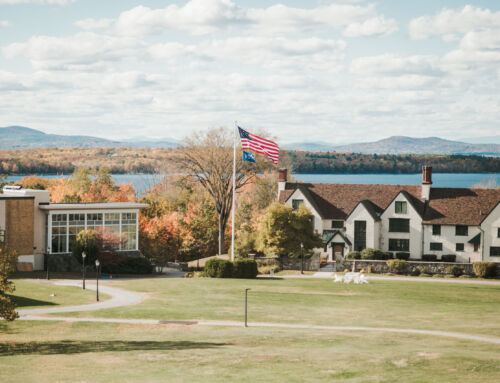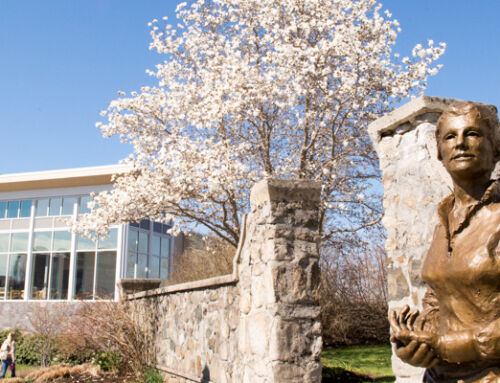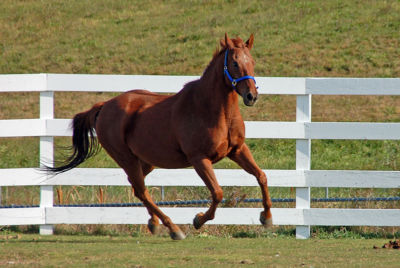
A rescued horse at the farm where Saint Joseph's students volunteered.
White picket fences surround fields dotted with horses. The animals gallop through the patches of mud and grass. Watching them glide across the pasture feels almost as free as the horses themselves. Never would you expect to be outside the classroom like this in college, but at SJC it’s quite common because of community based learning (CBL). CBL engages students in problem-solving experiences within their school and community. At Saint Joseph’s College, academic classes, athletic teams and clubs participate in community based service and hands-on learning. It is very common for courses at SJC to include hands-on projects outside of the classroom with community organizations. With CBL, students shift from being passive learners to active participants in both their education and community.
Professor Chris Callaway teaches a course at Saint Joseph’s College of Maine called “Honors Capstone Experience.” This course is part of the Honors Program at the College. The program is designed to offer an advanced core curriculum for students who show notable academic potential. It features activities outside of the classroom such as concerts, plays, museum visits, and travel. This year, it also included supporting program development and marketing for a horse rescue farm for The Maine State Society for the Protection of Animals (MSSPA).
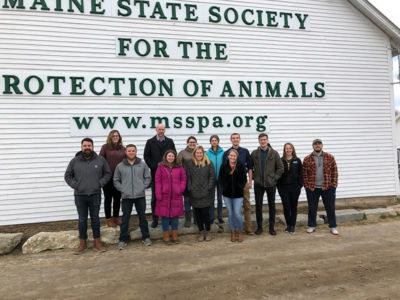
SJC students pictured at the MSSPA Horse Farm in Windham, Maine.
“Each year,” Callaway says, “I pick a different theme for that course, and then I choose readings and a Community Based Learning project that relates to it in some way. This year, the theme was ‘animals.’ I had driven past the Maine State Society for the Protection of Animals for years on my commute, and I thought they might be a good organization to work with.”
The MSSPA is an organization located in Windham, Maine, whose main goal is to provide shelter and care to abused and neglected horses in Maine. Their mission is to provide refuge, rehabilitation and placement to abandoned horses. This organization receives no federal, state or local funding. Instead it is funded by a combination of donations, bequests, grants and fundraising activities. The MSSPA does not charge for any services and seeks no reimbursement from any public source.
Robert Sheckler is the Volunteer Coordinator for the MSSPA. Sheckler had been wanting to launch a summer camp for grade-school kids at the horse farm, but needed help with research and finding resources. “I had exactly zero time to do any research on camp and I told Professor Callway’s students that. I provided them with a few parameters, and they did absolutely phenomenal research and did a presentation that said ‘here are local places and here is their pricing.’” The team of students designed several presentations of promotional material and camp research.
Sheckler continues “I don’t think we would have been able to move forward with this new program if we had not had the SJC Honors class. They actually created promotional materials for us like flyers and facebook posting materials to help publicize the camp. We just opened up the registration and it is going well so far. I do not think we would have launched the day-camp this year without their help.
Professor Callaway said, “I think the honors students learned a lot about the extent of animal abuse and neglect, and in particular the needs of horses. They also learned about themselves. At first, they were worried that they might not be able to pull the project off, since it wasn't the kind of work they are accustomed to doing. But we came up with a plan and managed to complete the project, and I think the MSSPA was really pleased with what we produced for them.”
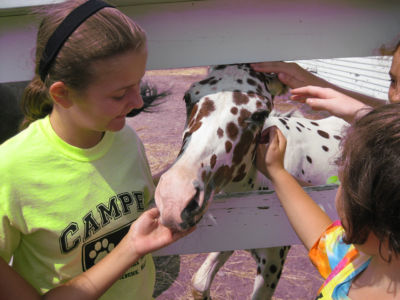
Students from SJC find the resources to make the MSSPA camp possible.
The new summer camp, called “Helping Hooves,” is the MSSPA’s first ever humane education summer camp. It is perfect for young animal welfare advocates with an interest in equine humane education at New England’s premier horse shelter. Activities at the camp include arts and crafts, horse care and education, featured guest speakers, grooming and games.
There are many ways to get involved with the MSSPA, which relies upon donations to care for the animals. The program called “Buy a Bale” allows people to help feed rescued horses by donating directly to their feeding and care. Of course, adopting is another way is to help. Much like how Saint Joseph’s College volunteered at the horse farm, MSSPA welcomes individual or group volunteers at the farm. The farm is also open to the public daily from 1-4PM at 279 River Road in Windham.

